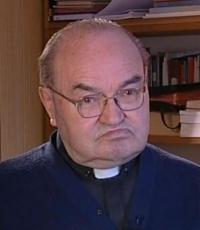“...it’s not eternity, you’ll bear up.”

Download image
Bernard Pánči was born on September 12, 1922 in Biely Potok near Ružomberok as one of nine children. In 1931 he started to attend the elementary school in Ružomberok. He continued his studies at a grammar school where he graduated in 1941. Yet in June of the same year he entered the seminary in Spišská Kapitula and in 1946 he was ordered a priest. His first stops were Oravské Veselé, Námestovo, Liptovský Mikuláš, and right after that - PTP (Auxiliary Technical Battalions) - as he belonged to the majority of priests who did not agree with the communist ideology. He was arrested on January 13, 1958, spent half a year in the remand centre in Žilina, and subsequently he was tried. On July 20, 1958 the sentence was passed - 13 years of imprisonment for committing a crime of high treason. Bernard served his sentence in Valdice near Jičín where he worked as a glass purist. He wasn’t released until the second amnesty in 1962. After that he worked in Lesostav (Forest Company) for one year and in Ružomberok as an assistant warehouser. Since March 19, 1966 he was a parish priest in Nižné Ružbachy for 21 years, later on he was moved to Matiašovce in Zamagurie, to Močenok, and to Spišská Kapitula.

